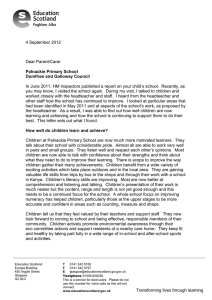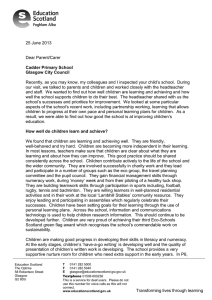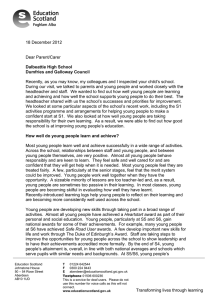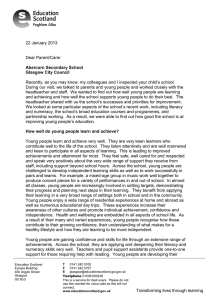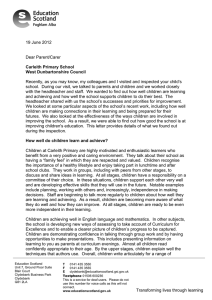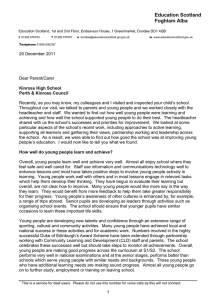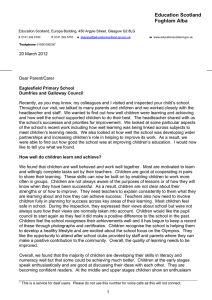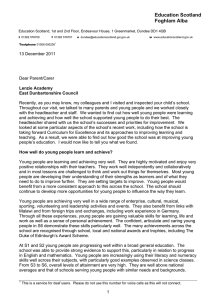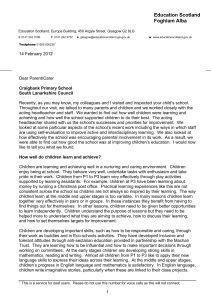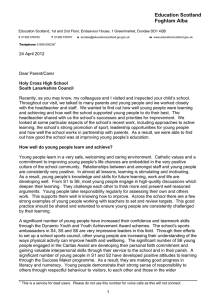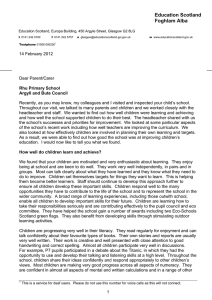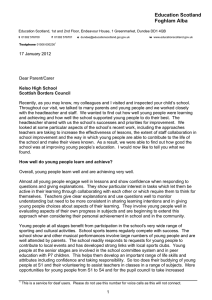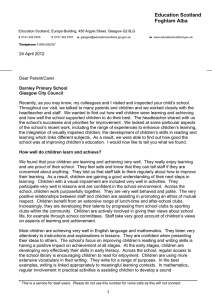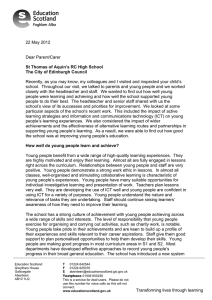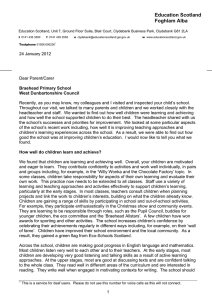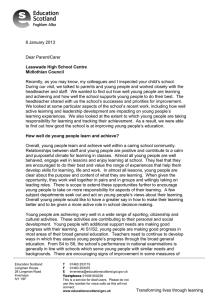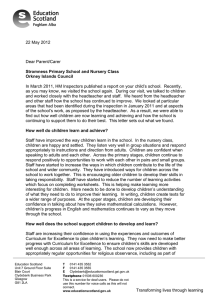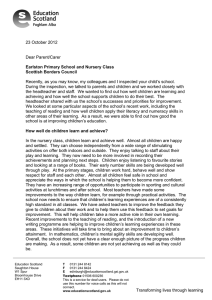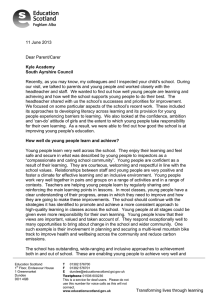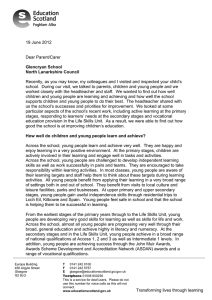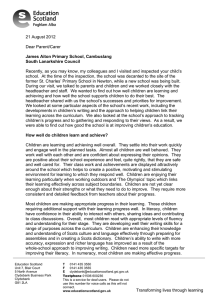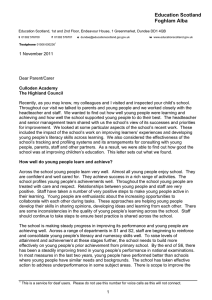27 August 2013 Dear Parent/Carer your child’s school. During
advertisement
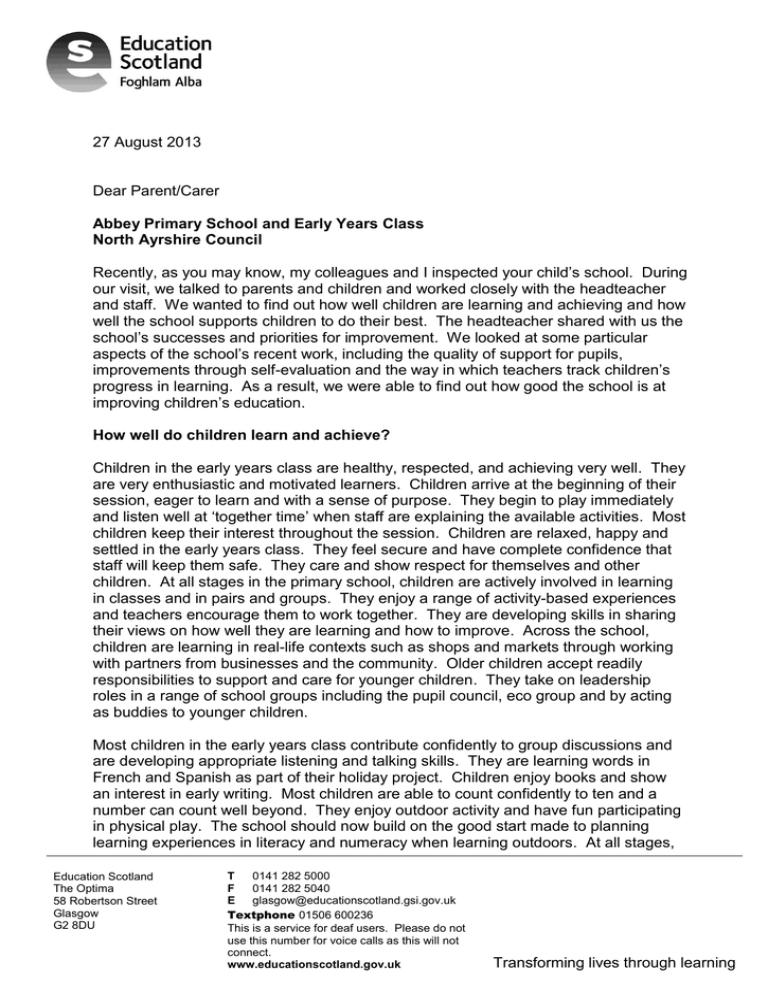
27 August 2013 Dear Parent/Carer Abbey Primary School and Early Years Class North Ayrshire Council Recently, as you may know, my colleagues and I inspected your child’s school. During our visit, we talked to parents and children and worked closely with the headteacher and staff. We wanted to find out how well children are learning and achieving and how well the school supports children to do their best. The headteacher shared with us the school’s successes and priorities for improvement. We looked at some particular aspects of the school’s recent work, including the quality of support for pupils, improvements through self-evaluation and the way in which teachers track children’s progress in learning. As a result, we were able to find out how good the school is at improving children’s education. How well do children learn and achieve? Children in the early years class are healthy, respected, and achieving very well. They are very enthusiastic and motivated learners. Children arrive at the beginning of their session, eager to learn and with a sense of purpose. They begin to play immediately and listen well at ‘together time’ when staff are explaining the available activities. Most children keep their interest throughout the session. Children are relaxed, happy and settled in the early years class. They feel secure and have complete confidence that staff will keep them safe. They care and show respect for themselves and other children. At all stages in the primary school, children are actively involved in learning in classes and in pairs and groups. They enjoy a range of activity-based experiences and teachers encourage them to work together. They are developing skills in sharing their views on how well they are learning and how to improve. Across the school, children are learning in real-life contexts such as shops and markets through working with partners from businesses and the community. Older children accept readily responsibilities to support and care for younger children. They take on leadership roles in a range of school groups including the pupil council, eco group and by acting as buddies to younger children. Most children in the early years class contribute confidently to group discussions and are developing appropriate listening and talking skills. They are learning words in French and Spanish as part of their holiday project. Children enjoy books and show an interest in early writing. Most children are able to count confidently to ten and a number can count well beyond. They enjoy outdoor activity and have fun participating in physical play. The school should now build on the good start made to planning learning experiences in literacy and numeracy when learning outdoors. At all stages, Education Scotland The Optima 58 Robertson Street Glasgow G2 8DU T 0141 282 5000 F 0141 282 5040 E glasgow@educationscotland.gsi.gov.uk Textphone 01506 600236 This is a service for deaf users. Please do not use this number for voice calls as this will not connect. www.educationscotland.gov.uk Transforming lives through learning children understand the importance of regular physical activity for good health. Through their experience of a range of sports, country dance and other activities they are developing their understanding of the importance of an active lifestyle. Most children at the primary stages are performing at appropriate levels in reading and writing and are making steady progress in developing their skills. Overall, most children are making good progress towards achievement in mathematics and numeracy skills. During money and finance week, children show skills in budgeting and understanding of basic economic concepts such as needs and wants and managing money in future life. In some classes teachers’ questions could challenge them more. The school is now working towards its third Eco-Schools Scotland green flag for its work in promoting children’s awareness of environmental issues. Children are leading improvements including developing the school grounds, making a willow tunnel and creating a wildlife garden. All children in P6 are on course to achieve the John Muir Award for their work on conservation. How well does the school support children to develop and learn? Staff are increasingly confident when using Curriculum for Excellence guidance to plan children’s learning. When planning activities, staff take good account of children’s interests. They make effective use of the very attractive outdoor areas to enhance children’s learning. In the early years class, staff have a clear and shared understanding of how literacy, numeracy and health and wellbeing can be developed across the curriculum and are delivering this well. They now need to review their wide range of planning formats and agree a more manageable method of planning the curriculum. Across the primary school, information and communications technology is widely used to support children’s learning in a variety of situations. Children are confident using a range of technology including tablets, cameras and interactive smart boards. The P2 class produced a digital film of their work on the ‘Lighthouse Keeper’s Lunch’. Staff work well with a range of partners nationally and locally to support and enhance children’s learning. For example, the Active Schools coordinator provides after-school clubs, NHS Scotland work with staff to deliver the ‘Jumpstart’ programme and staff at Eglinton Country Park are helping to develop children’s understanding of sustainability issues and the environment. Children are well supported to make the change from the early years class to P1 and from P7 to S1. Staff need to further develop their approaches to assessing children’s learning to ensure they make suitable progress. Staff in the early years class provide a nurturing and supportive environment in which all children are happy, relaxed and settled. They are responsive to children’s individual needs and circumstances. Tasks and activities meet the needs of most children. We have asked staff to provide a greater level of challenge for higher-achieving children. Staff have worked very effectively to improve parental partnerships. Parents provide strong support for a range of activities including sessions where parents join with their children for play activities. For example, ‘Man Monday’ targeted very successfully the involvement of fathers and other male relatives in learning activities which involved reading with their children, making healthy soups at ‘soup school’ and ‘baking classes’. Staff in the school offer an inclusive environment for learning. In most lessons in the primary school, staff ensure that tasks and activities provide an appropriate level of challenge for most children. The highly effective support for learning teacher uses a range of assessment approaches to 2 identify and support children with additional support needs. The school’s very effective approaches to meeting the needs of children include strong partnership working. This ensures that children, including those with social and emotional difficulties get the right help at the right time. The school has well-established arrangements for keeping under review the progress of children with a range of additional support needs including when they move to secondary school. How well does the school improve the quality of its work? The headteacher and staff are highly committed to school improvement and have worked together to improve the quality of children’s experiences, the learning environment and resources for learning. They encourage successfully positive behaviour and ensure that best practice observed in classes is shared across the school. Staff discuss their work regularly. They are keen to develop further a shared understanding of approaches to assessment, recording progress and reporting to parents through working with their colleagues in the teacher learning community. Early years practitioners are not sufficiently involved in contributing to improvement priorities nor in showing what impact improvements they have made on children as learners. The school should take further steps to develop the role of the Parent Council and involve them more directly in deciding the school’s priorities for improvement. This inspection of your school and early years class found the following key strengths. The quality of learning experiences throughout the school. Significant success in improving children’s understanding of environmental issues and ways to protect the environment. The effective work of the early years class in involving parents in their children’s learning and in developing children’s life skills. Partnership working with local and national groups which enhances the curriculum and learners’ experiences. Support for children with additional support needs and those in challenging circumstances to ensure that they benefit from learning. We discussed with staff and the education authority how they might continue to improve the school and early years class. This is what we agreed with them. Continue to improve arrangements to assess and track children’s progress across the school and the early years class. Further improve approaches to self-evaluation including continuing to develop the role of parents and the early years staff in school improvement. 3 What happens at the end of the inspection? We are satisfied with the overall quality of provision. We are confident that the school’s self-evaluation processes are leading to improvements. As a result, we will make no further visits in connection with this inspection. The local authority will inform parents about the school’s progress as part of the authority’s arrangements for reporting to parents on the quality of its schools. Kate Hannah HM Inspector Additional inspection evidence, such as details of the quality indicator evaluations, for your school can be found on the Education Scotland website at http://www.educationscotland.gov.uk/inspectionandreview/reports/school/primsec/Abb eyPrimarySchoolNorthAyrshire.asp. If you would like to receive this letter in a different format, for example, in a translation please contact the administration team on the above telephone number. If you want to give us feedback or make a complaint about our work, please contact us by telephone on 0141 282 5000, or e-mail: complaints@educationscotland.gsi.gov.uk or write to us addressing your letter to the Complaints Manager, Denholm House, Almondvale Business Park, Livingston EH54 6GA. 4
